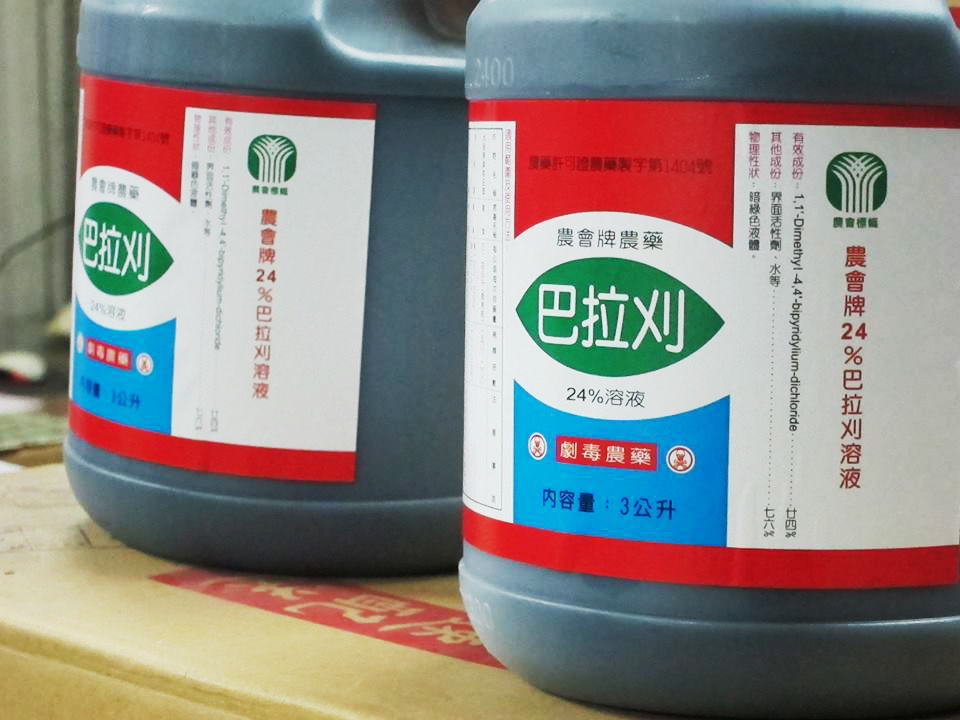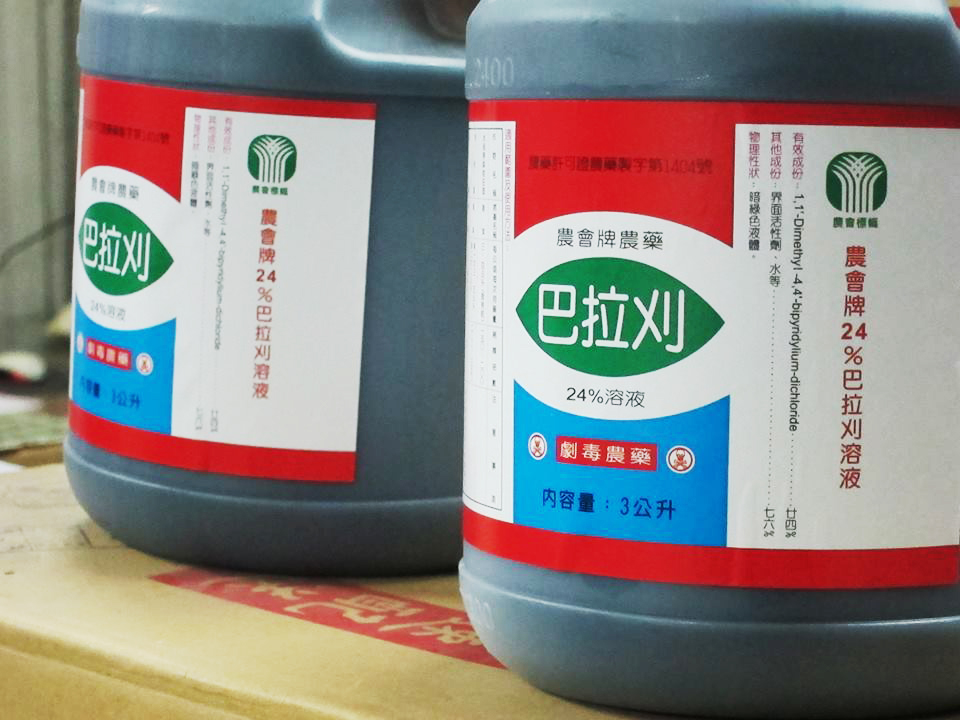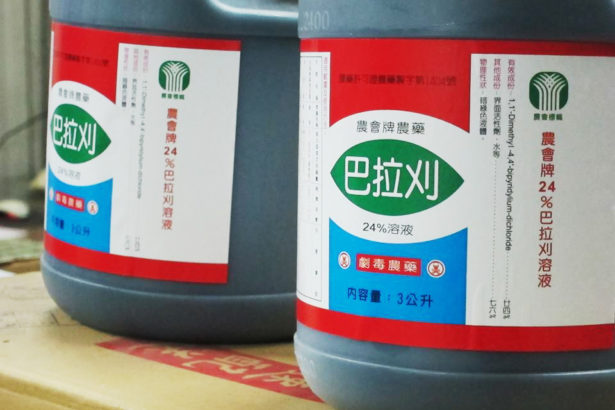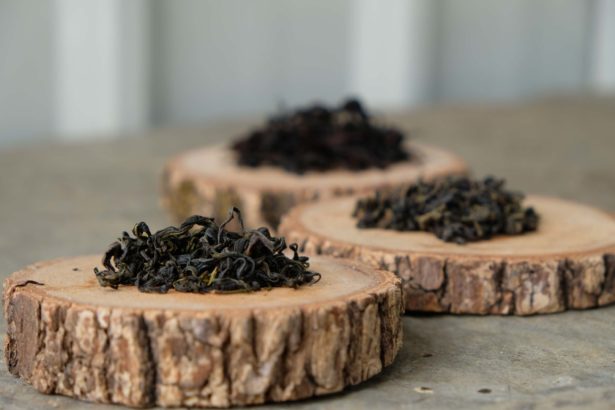Paraquat ban extended for one year, Prevention and Inspection Bureau: exit will remain the same, but farmers hoard too much, it will take time to degrade in case it gets worse.
Share104 +1 Tweet EmailShares 104
On the eve of the entry into force of the Parakat ban, it was announced that it would be postponed for another year! Considering that the current inventory of paraquat is excessive, pesticide manufacturers and farmers still have 700 metric tons of paraquat in hand, in order to avoid farmers 'fear of using it at home, which may cause remaining risks, and the Council of Agriculture estimates that the inventory will take about one year to digest, it was announced yesterday (30) that the original ban on the sale and use of paraquat will be postponed for another year, and will officially take effect from February 1, 2020. Feng Haidong, director of the Bureau of Prevention and Inspection of the Council of Agriculture, stressed that there has been no change in the policy of withdrawal from the market, and urged farmers and farmers not to buy hoarding again.
News Dictionary: The Council of Agriculture launched a 10-year pesticide halving policy, but the total amount of pesticides used in China in 2017 totaled 10,549 metric tons, a new high since 2000 and an increase of 1,045 metric tons over the previous year. Herbicide consumption reached a record high of 4,392 tonnes (as active ingredient). Feng Haidong once said in an interview that many farmers snapped up and hoarded goods before the ban, which was about the usual sales volume of two years, thus causing the total pesticide consumption in 2017 to hit a 17-year high.
! function(e,t,s,i){var n="InfogramEmbeds",o=e.getElementsByTagName("script"),d=o[0],r=/^http:/.test(e.location)? "http:":"https:";if(/^\/{2}/.test(i)&&(i=r+i),window[n]&&window[n].initialized)window[n].process&&window[n].process();else if(! e.getElementById(s)){var a=e.createElement("script");a.async=1,a.id=s,a.src=i,d.parentNode.insertBefore(a,d)}}(document,0,"infogram-async","//e.infogram.com/js/dist/embed-loader-min.js");
24% Paraquat solution was originally banned in February this year (2019), but now it is extended for one year.
Paraquat pesticide toxicity is strong, often by public misuse or suicide can not be cured, the Bureau of Prevention and Inspection announced that since February 1 last year, no more manufacturing and import of "24% paraquat solution"(hereinafter referred to as paraquat), and originally scheduled February 1 this year, a total ban on the sale and use of paraquat products.
Pesticide manufacturers need to report their production and sales information every season. The latest inventory of the Inspection Bureau on the 15th of this month found that there are still more than 700 metric tons of paraquat in the hands of operators and farmers on the market. If farmers dare not use it at home, it may cause other risks. Therefore, the resolution will extend the prohibition period for another year."Now it is excessive stocks. If it is fully recovered, it is also a great burden. The most common way to remove pesticides is to let the market use up slowly. In addition, we may consider exporting some of the Parakat commodities." Feng Haidong said.
However, Tsou Hui-chuan, deputy director of the Bureau of Disease Control and Inspection, adds that although export is also one of the channels for chemical removal, and there is no ban on paraquat export at present, according to the information sold by pesticide retailers, farmers currently have more paraquat in their hands than manufacturers have in stock."Farmers will not be able to export it. If paraquat continues to lie at home, it will only increase the risk of misuse. Therefore, extending the deadline and advocating safe use of paraquat is the priority now."


A one-year grace period for paraquat ban (upstream and downstream information photos)
Will it continue if hoarding continues? Bureau of Inspection and Prevention: The market can no longer manufacture and import a year ago
Feng pointed out that the proposed pesticide withdrawal should consider its use period and chemical removal progress, but sometimes the practice may not meet expectations, similar situations have occurred in the past: the severely toxic pesticide "40% emulsion of methasone" was originally planned to withdraw on December 31,2010, but later inventory found that the market inventory is too large, so the ban period will be extended for another two years,"it is not common to extend the pesticide ban, but it is also necessary to consider the market situation in time to make adjustments."
Does this create doubts among farmers about continuing to buy and extending the ban in the future? He responded,"The market stopped manufacturing and importing paraquat a year ago [February 1, 2018], and now the total is [700 metric tons]." Emphasize that the government has mastered the information and the total market volume will not increase.
Feng Haidong further explained that paraquat used to be used for weeding and treatment of red bean drying. It is a pesticide with a large amount of use in China. The average annual consumption of API is about 400 metric tons. At present, there are 700 metric tons of paraquat finished products, which are converted into active ingredients of about 180 metric tons. Therefore, it is estimated that the market stock can be digested in another year.
He stressed that the policy of paraquat withdrawal has not changed, but hopes to reduce the risk of hoarding by extending the use period. He also urged farmers not to buy hoarding any more, as long as they abide by the safety use regulations and use up the existing paraquat as soon as possible by the end of January next year.
The ban on "33.6% bataquat suspension" remains unchanged and will be banned from February 1, 2019.
As for the alternatives to paraquat originally promoted: nonanoic acid, which can be used as a herbicide, and the new red bean plant desiccant NA-yci1, which is a safe material, the FDA stressed that it will continue to promote it, or hope that farmers can replace the use of high-risk pesticides with relatively safe and friendly materials.
On the other hand, the "33.6% bataquat suspension", which is also included in the list of retired pesticides, is a mixture of paraquat and daryuron. Since there is no doubt about excessive stocks, the ban plan is carried out as scheduled. Starting tomorrow (February 1), illegal sales will be punishable by up to 7 years in prison and a fine of up to 7.5 million yuan in accordance with the Pesticide Management Law. People who use illegal products will also be fined between 15,000 yuan and 150,000 yuan.
Don't harvest red beans with paraquat! The new red bean desiccant developed by the Drug Poison Institute is 3,000 yuan per hectare to encourage farmers to try it out.
Ban Paraquat Impact Red Bean Industry Farmers Strive for Transformation Peace of Mind to Find a Way
Taiwan pesticide use hits 17-year high! US court awarded Jiapusai high compensation price, protected baby banned Tausong, Taiwan whether to follow up?
Not a single plant remains-excessive herbicide impacts soil ecology and increases cancer
Share104 +1 Tweet EmailShares 104
- Prev

Paraquat ban extended for one year, Prevention and Inspection Bureau: exit unchanged, but farmers hoard too much, need to be removed to prevent accidental eating worse
Paraquat ban extended for one year, Prevention and Inspection Bureau: exit unchanged, but farmers hoard too much, need to be removed to prevent accidental eating worse
- Next

"A southerly breeze. "Xunwei" people share a cup of tea with the mountains.
"A southerly breeze. "Xunwei" people share a cup of tea with the mountains.
Related
- A course of planting techniques and methods on how to grow carrots
- How to plant the latest tulips?
- Is it better to pick tea in the morning or in the afternoon? When is the best time for tea to be picked? what is the third or fifth tea?
- Launch Yuanxiao Happy combination Haocha + Tea Yuan healthy Taste
- Penghu Tourism "Fireworks 20 Parade with You"
- 2022 West Lake Happiness holds "Digital Revitalization Voucher" and draws iphone13 and laptop.
- Banqiao Fuzhou social houses are designed to change start-up combined with police elimination to create a safe and livable environment
- The convenient measure of "mechanical weeding" in Xinbei has been abused and the Agriculture Bureau has imposed heavy penalties on the illegal land consolidation.
- Changgeng University Joins Hands with Four Memory Factories to Rescue Memory Talent Shortage
- The list of Taiwan's top 100 MVP managers is listed by the Director-General of the Farmers' Association of Sanxia District.

